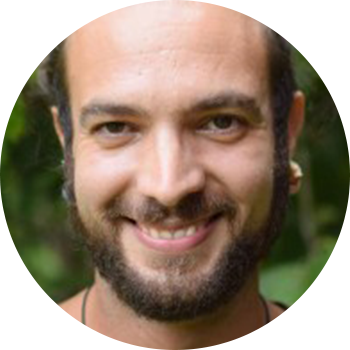Ponencia:
Hacia una ecología social sentipensante: el potencial terapéutico de la ayahuasca mas alla del individuo

Adam Aronovich
En los últimos años, la ayahuasca ha ido ganando creciente reconocimiento por su valor terapéutico desde diferentes sectores de la sociedad y las ciencias de la salud. En base al trabajo de campo realizado en un centro especializado en facilitar terapias con ayahuasca en la amazonia peruana, examinaremos algunos de los temas centrales que surgen de las narrativas recogidas en un centro de retiros de ayahuasca en Iquitos a través de entrevistas semi-estructuradas, tanto de participantes occidentales como de participantes indígenas amazónicos. Aunque la mayoría de los estudios actuales se centran únicamente en las dimensiones psicológicas de la sanación, muchas narrativas resaltan temáticas de ecología social, particularmente la conexión o reconexión a uno mismo, a otros seres humanos, a la naturaleza, y a lo transcendente. Esta reconexión se podría caracterizar como un re-surgimiento del sentipensamiento, termino recogido por Fals Borda, entre otros, y que remite a un proceso cognitivo que incluye tanto el pensamiento como el sentimiento, pensar con el corazón, en contrate con el pensamiento enraizado al racionalismo cartesiano, y aún más, en un sentipensamiento que va mas allá del individuo, en el término desarrollado por Arturo Escobar como sentipensando con la tierra. Teorizamos que una parte importante de la sanación experimentada a través de las experiencias de ayahuasca es atribuible a esta oportunidad de re-situar al individuo dentro de una matriz cognitiva más inclusiva, fruto de un rompimiento con la cosmovisión individualista que permea las ciencias médicas y psicológicas. In recent years, Ayahuasca has gained increased recognition and validation for its therapeutic value, coming from different sectors of society and the health sciences. Based on the fieldwork carried out in a center that facilitates ayahuasca-based workshops in the Peruvian Amazon, Temple of the Way of Light, we will present some of the central themes that arise from the narratives collected through semi-structured interviews, both from Western participants and from indigenous Amazonian participants. Although current studies tend to focus on the psychological dimensions of the ayahuasca experience, many narratives emphasize themes related to our social ecology, with connection or reconnection to oneself, to other human beings, to nature, and to the transcendental being central in many experiences. This shared experience of «reconnection» could be thought of as a re-emergence of Sentipensamiento, or «feeling-thinking», a term that refers to a cognitive process that includes both thought and feeling: to think with one’s heart, as contrasted with the dominant rationalism that prevails in Western epistemology. Moreover, it is the re-emergence of a feeling-thinking process that moves beyond the individual, in the term developed by Colombian anthropologist Arturo Escobar as “feeling-thinking-with-the-ear
